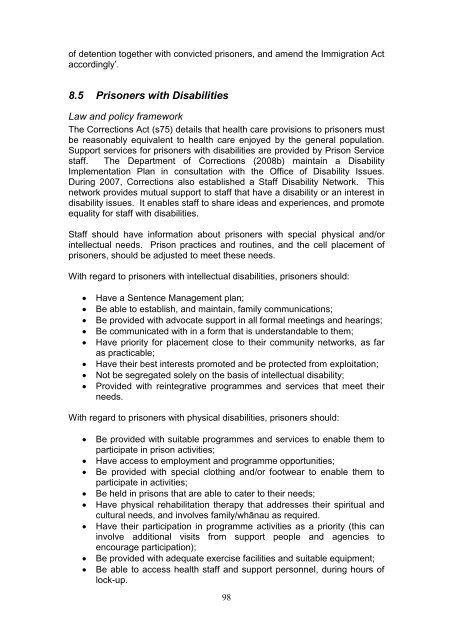Human Rights and Prisons - Rethinking Crime and Punishment
Human Rights and Prisons - Rethinking Crime and Punishment
Human Rights and Prisons - Rethinking Crime and Punishment
You also want an ePaper? Increase the reach of your titles
YUMPU automatically turns print PDFs into web optimized ePapers that Google loves.
of detention together with convicted prisoners, <strong>and</strong> amend the Immigration Act<br />
accordingly‟.<br />
8.5 Prisoners with Disabilities<br />
Law <strong>and</strong> policy framework<br />
The Corrections Act (s75) details that health care provisions to prisoners must<br />
be reasonably equivalent to health care enjoyed by the general population.<br />
Support services for prisoners with disabilities are provided by Prison Service<br />
staff. The Department of Corrections (2008b) maintain a Disability<br />
Implementation Plan in consultation with the Office of Disability Issues.<br />
During 2007, Corrections also established a Staff Disability Network. This<br />
network provides mutual support to staff that have a disability or an interest in<br />
disability issues. It enables staff to share ideas <strong>and</strong> experiences, <strong>and</strong> promote<br />
equality for staff with disabilities.<br />
Staff should have information about prisoners with special physical <strong>and</strong>/or<br />
intellectual needs. Prison practices <strong>and</strong> routines, <strong>and</strong> the cell placement of<br />
prisoners, should be adjusted to meet these needs.<br />
With regard to prisoners with intellectual disabilities, prisoners should:<br />
<br />
<br />
<br />
<br />
<br />
<br />
<br />
<br />
Have a Sentence Management plan;<br />
Be able to establish, <strong>and</strong> maintain, family communications;<br />
Be provided with advocate support in all formal meetings <strong>and</strong> hearings;<br />
Be communicated with in a form that is underst<strong>and</strong>able to them;<br />
Have priority for placement close to their community networks, as far<br />
as practicable;<br />
Have their best interests promoted <strong>and</strong> be protected from exploitation;<br />
Not be segregated solely on the basis of intellectual disability;<br />
Provided with reintegrative programmes <strong>and</strong> services that meet their<br />
needs.<br />
With regard to prisoners with physical disabilities, prisoners should:<br />
<br />
<br />
<br />
<br />
<br />
<br />
<br />
<br />
Be provided with suitable programmes <strong>and</strong> services to enable them to<br />
participate in prison activities;<br />
Have access to employment <strong>and</strong> programme opportunities;<br />
Be provided with special clothing <strong>and</strong>/or footwear to enable them to<br />
participate in activities;<br />
Be held in prisons that are able to cater to their needs;<br />
Have physical rehabilitation therapy that addresses their spiritual <strong>and</strong><br />
cultural needs, <strong>and</strong> involves family/whānau as required.<br />
Have their participation in programme activities as a priority (this can<br />
involve additional visits from support people <strong>and</strong> agencies to<br />
encourage participation);<br />
Be provided with adequate exercise facilities <strong>and</strong> suitable equipment;<br />
Be able to access health staff <strong>and</strong> support personnel, during hours of<br />
lock-up.<br />
98
















